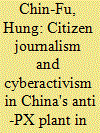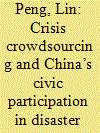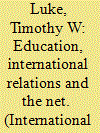|
|
|
Sort Order |
|
|
|
Items / Page
|
|
|
|
|
|
|
| Srl | Item |
| 1 |
ID:
122988


|
|
|
|
|
| Publication |
2013.
|
| Summary/Abstract |
Using the case of the Xiamen anti-paraxylene (PX) plant movement, this article investigates the evolving phenomenon of citizen journalism with Chinese characteristics in the information age, with a focus on ICT-empowered environmental activism and the implications of citizen journalists on China's sociopolitical development. It is argued that enhanced public participation and environmental rights defences are developing effectively in China. The increase in alternative information available online through internet-mediated bloggers as well as citizen journalists is posing a formidable challenge to both the Communist Party of China's propaganda-filled media environment and its effective governance. Furthermore, the net's sociopolitical impact in China will be shaped and determined less by the intrinsic nature of the internet itself than by the underlying political dynamics of public opinion, civil participation, citizen journalism and cyber-activism.
|
|
|
|
|
|
|
|
|
|
|
|
|
|
|
|
| 2 |
ID:
156521


|
|
|
|
|
| Summary/Abstract |
The devastating 2008 Wenchuan earthquake unfolded the co-evolution of a proactive civic engagement and extensive application of web-based information and communication technologies (ICTs) in China’s disaster response. However, existing literature has not yet sufficiently examined how ad hoc web-based voluntary participation has led to long-term development of digital disaster management in China in the wake of the Wenchuan earthquake of 2008. The present article addresses this gap by focusing on one specific type of ICT-mediated civic effort, crisis crowdsourcing, and presenting newly collected empirical evidence from relief work in the 2008 Wenchuan, 2010 Yushu, and 2013 Lushan earthquakes. This article examines the emergence of a broad-based digitally enabled civic participation in disaster response and its more general political implications. The main findings of this study suggest that web-based ICTs have not only enabled the relatively weak and episodic social actors to overcome constraints on information, fundraising, organizational development and to achieve collective development in a field historically dominated by the state, but also facilitated the evolution of a parallel disaster management system with agenda, skills and expertise independent of the state.
|
|
|
|
|
|
|
|
|
|
|
|
|
|
|
|
| 3 |
ID:
052638


|
|
|
| 4 |
ID:
191863


|
|
|
|
|
| Summary/Abstract |
This qualitative feminist study sheds light on women’s shifting identities, struggles, and resistances in the most conservative Gulf state, Saudi Arabia, unpacking the shifting socio-political and mediated environments in this country and their impact on gendered activism. Through conducting in-depth interviews with ten Saudi women activists, journalists, and writers, this study investigates Saudi women’s multiple feminisms and activisms, as they are expressed and enacted by different women using the phenomenon of “cyberactivism”, and its sister phenomenon of “cyberfeminism”, to participate in the waves of socio-political transformation in the volatile Gulf region. In discussing how Saudi women are leveraging social media to advance their agendas, amplify their voices, highlight their demands, and enact new forms of leadership, agency, and empowerment, the double-edged sword effect of social media is unpacked. Adopting a postcolonial feminist approach, this study examines the potentials, challenges, and paradoxes of using social media to advance Saudi women’s rights in a rapidly shifting state.
|
|
|
|
|
|
|
|
|
|
|
|
|
|
|
|
|
|
|
|
|